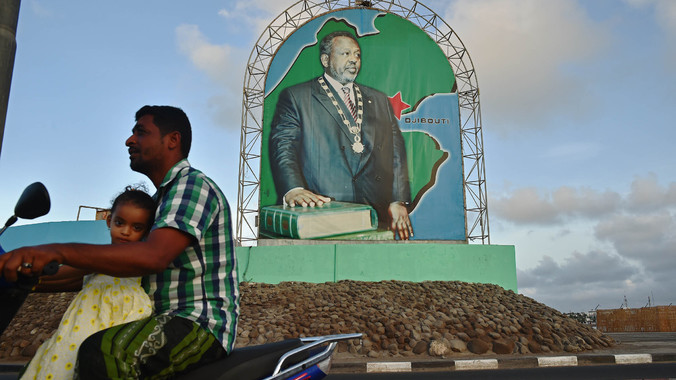PBS: Escaping Eritrea … [Read More...] about ካብ ውሽጢ ቤት ማእሰርታት ኤርትራ
Allies silent on Djibouti human rights abuses
Geoff Hill |
Western nations won’t intervene lest they upset a strategic partnership or usher in another despot.
At least half a dozen African countries have leaders intent on clinging to power, with the African Union seemingly moribund on the issue.
In Zimbabwe, 91-year-old President Robert Mugabe has indicated his willingness to stand for elections in 2018, while Burundi’s Pierre Nkurunziza has pushed through a third term, as has Rwanda’s President Paul Kagame. And this is not to mention the likes of The Gambia’s Yahya Jammeh, who recently stated he would be happy to rule “for a billion years”.

In May, an opinion poll of 34 African states showed almost 75% of those questioned thought their rulers should serve for only a set time.
The Western world carefully words their disapproval but is wary of insisting on regime change, fearful of what may emerge.
Professor Gregory Stanton, the founding president of Genocide Watch, the global monitor he started in 1999 as an early warning for mass murder, wrote the United Nations resolutions that created the Rwanda Tribunal and was instrumental in setting up the special court in Cambodia to try members of the Pol Pot regime.
Speaking from Washington, he said there was a fear that if calls for a change of president led to another massacre, “then those who made the call might be blamed. Politicians are wary of that.”
But he said the need for strategic partners can also usher a “blind neglect of human rights”.
“America and the EU [European Union] are terrified of upsetting countries like Saudi Arabia or Pakistan because of the role they play in the ‘war on terror’. In Africa, that honour goes to Djibouti and, even after police opened fire on a crowd before Christmas, we have barely heard a peep out of Washington, London or Paris.”
Djibouti’s President Ismaïl Guelleh had promised the 2010 amendment that gave him a third term would be his last. Now he plans to stand again this year.
His ruling People’s Rally for Progress controls all 65 seats in Parliament and most of the press.
But efforts in November to pursue a long-time opponent through the British courts lifted the veil, at least partly, on a country where the only leaders since independence from France in 1977 have been Guelleh and his uncle.

Abdourahman Boreh is head of external relations for the opposition Union pour le Salut National, and fled the tiny republic after calling for the president to abandon efforts for a third term. His assets were seized by state militia and he was convicted in absentia of inciting a grenade attack on a supermarket in Djibouti City.
He denies the charge, but the state pursued the allegation through a court in London and lost when it emerged some of the evidence against Boreh had been falsified.
Not content, the government brought a new charge of corruption. But Boreh’s lawyers turned the tables when they convinced the London High Court that, since most of the contracts in question were linked to the president, it was only fair to also look at the financial affairs of Guelleh. Tales emerged of the first family’s hand in state and private business, along with palatial homes and up to 80 cars.
On December 19, a religious gathering in Djibouti City began shouting political slogans. Police opened fire with live ammunition and a brief government statement initially put the death toll at seven, then nine, later adding that 50 police had been injured. They say the crowd was overrun by an armed mob.
Estimates from opposition groups also vary, as they claim a death toll of between 19 and 37 and up to 100 people injured. Unlike the government, the opposition has called for independent verification.
In London, Boreh has refused to discuss his court case until judgment – expected in the coming weeks – but said he was saddened by a lack of condemnation of the shooting.
“The world has a duty to ensure justice is done,” he said. “The international community cannot stand by and allow violence in Djibouti to escalate, while those responsible for shooting unarmed civilians go unpunished.”
It may be wishful thinking. The AU, busy with efforts to prevent a genocide in Burundi, has made no meaningful statement. Djibouti is home to the United States’s only declared military base in Africa, and the best Washington could do was issue a call for dialogue and restraint to allow for “peaceful and transparent elections”.
Each long-term leader has a way of dealing with critics, but Guelleh doesn’t even bother with the niceties. Djibouti may be small but it controls the entrance to the Red Sea and the Suez Cana, land plays a major role in the US “war on terror”. France also has a base there, and China and Russia have announced plans to station troops in the country.
“It’s for this very reason we need democracy,” Boreh says. “Here is one of the most strategic countries in the world essentially run by one man, with huge revenues from foreign armies and the port, yet the people lack running water.”
Stanton agrees. “Poverty, oppression and impunity for the armed forces: these are the things that cause a revolt. It’s been like that since the French Revolution and it remains the case today.”
Too many countries, he said, used strategic location or fear of past events to silence their critics.
Boreh said it was time to apply a single rule to all nations.
“It’s called the Universal Declaration of Human Rights because it apples to all humans. If you think Africans are not human, then have the courage to say so. Otherwise, we in Djibouti and across the continent deserve the same freedom as everyone else.”
That may be expecting a lot from 2016.
